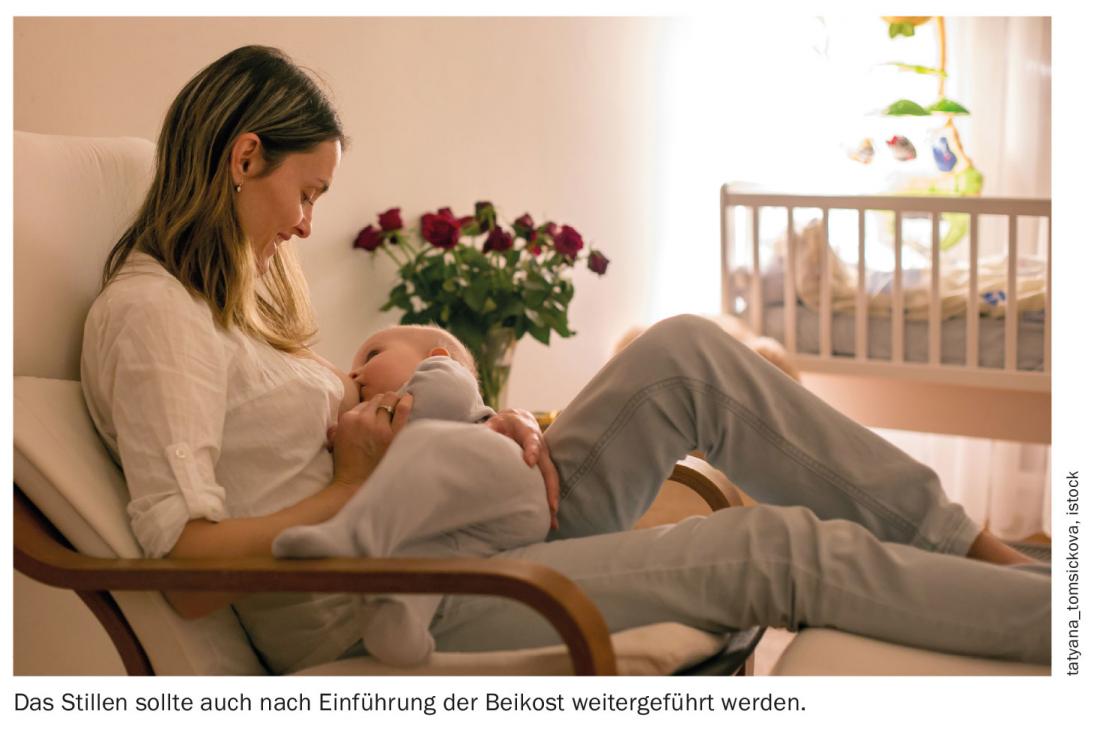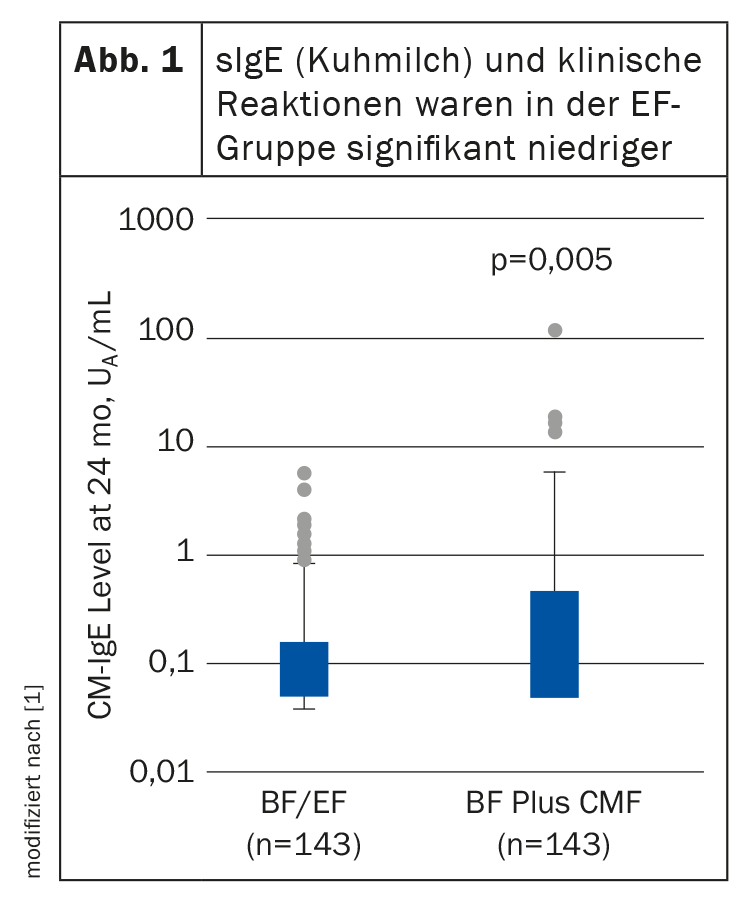When it comes to allergy prevention, what are the priorities for supplemental feeding? How should the administration of cow’s milk-based formula be evaluated? Are supplements a reliable preventive measure? And what is the ideal prevention of chicken egg and peanut allergies? Many uncertainties exist in allergy prevention in the first days and months of life. A new S3 guideline is now to provide physicians with binding recommendations.
The central point of the guideline is the role of breastfeeding and complementary feeding in allergy prevention, according to Prof. Dr. Matthias Kopp, Medical Director of the Medical Division for Children and Adolescents at the Children’s Hospital of the Inselspital Bern and member of the guideline group. In this context, the expert explicitly emphasized the many benefits of breastfeeding: “Any breastfeeding has many advantages for mother and child”. Specifically, the guideline commission recommends exclusive breastfeeding for the first four to six months, if possible, and continuing to breastfeed after the introduction of complementary feeding. In addition, the panel states that avoidance of potent food allergens due to dietary restriction during pregnancy and lactation has no preventive effect. It should also not be done for this reason.
Caution with cow’s milk formulas
A new recommendation included in the guideline is to refrain from feeding formula milk during the first few days if the mother wishes to breastfeed. The recommendation is based on a Japanese paper (Fig. 1) [1]. In this study, 312 infants received either breast milk (BF) and a cow’s milk formula (CMF) or breast milk and an amino acid-based formula (EF) during the first few days. After administration, sensitization was determined for each group by specific IgE and clinical reactions were assessed by food provocation test. Result: Sensitization as well as clinical reactions were significantly higher with BF and CMF administration than with BF and EF.
Prevention during the introduction of complementary feeding
Two other guideline recommendations are dedicated to the introduction of complementary foods: one on the prevention of chicken egg allergy, the other on peanut allergy. Here, the guideline committee relies on a clinical trial also conducted in Japan [2]: 147 infants initially received a continuously repeated administration of 50 mg from the 6th month of life (LM), then 250 mg of thoroughly heated hen’s egg from the 9th LM. Follow-up in an open NM provocation showed that the children who had received continuous chicken egg administration were significantly less allergic. A similar conclusion, albeit more cautiously expressed, is conveyed by the guideline on the administration of peanuts in complementary feeding. Here, too, early administration can significantly reduce the allergy potential: “To prevent peanut allergy, consideration can be given to introducing peanut products in an age-appropriate form (e.g., peanut butter) to infants with atopic dermatitis in families with regular peanut consumption as part of the introduction of complementary foods,” says Prof. Kopp. The basis for this recommendation is the LEAP (Learning Early about Peanut Allergy) study [3].
Due to a very heterogeneous data situation, however, the guideline commission did not recommend the primary preventive administration of supplements, although in principle it assumes the existence of susceptible subgroups. However, according to the expert, the appropriate dose and the endpoints are unclear, in addition to the appropriate intervention period. There was insufficient evidence for either prebiotics, probiotics, vitamin D, or the administration of omega 3 LCPUFAs for allergy prevention. Work by Litonjua AA et al. [4,5] demonstrate that high-dose maternal vitamin D supplementation during pregnancy has no primary preventive effect. Effects on asthma or wheeze, pulmonary function parameters, eczema, allergic rhinitis, or allergic sensitization were used as a basis.
Keeping dogs and cats
Very precise recommendations are given by the Guidelines Commission on the keeping of pets. Thus, for families without a recognizable increased risk of allergies, there is no need to restrict the keeping of cats or dogs. If, on the other hand, there is an increased risk of allergy in a family, the guideline clearly differentiates according to the type of animal: while keeping dogs is harmless, keeping cats should be discouraged, especially if children with pre-existing atopic eczema are part of the household.
More recommendations
Several recommendations already included in the previous guideline have again found their way into the new version. Thus, the guideline still recommends: “Interventions to reduce exposure to house dust mite allergens (…) should not be carried out with the aim of primary prevention.” Furthermore, the guideline unreservedly recommends the avoidance of overweight/obesity in women before and during pregnancy as well as in children and adolescents for reasons of asthma prevention. Furthermore, the Guideline Commission continues to advocate vaccination of all children (including at-risk children), in Germany according to the currently valid recommendations of the STIKO. Also, women should be made aware of the child’s slightly increased risk of asthma if born by elective cesarean section during birth mode consultations.
The new S3 guideline Primary Allergy Prevention is currently with the professional societies for final approval and will be published in the next few months.
Take-Home Messages
- Children should be breastfed for 4 to 6 months if possible, complementary foods should be introduced from 4th to 6th LM, with accompanying breastfeeding.
- Dietary restrictions have no preventive effect in the first year of life.
- If there is no increased risk of allergies, keeping pets is possible without restrictions.
- If the risk of allergy is increased, keeping cats is not recommended.
- Even during pregnancy, avoid exposure to smoke and emissions, as well as obesity.
Source: Kopp M: Prevention and therapies of atopic and allergic diseases. Streamedup! – Pediatrics Live: Prevention and Therapies of Atopic and Allergic Diseases, Nov. 30, 2021.
Literature:
- Urashima M, et al: Primary Prevention of Cow’s Milk Sensitization and Food Allergy by Avoiding Supplementation With Cow’s Milk Formula at Birth. JAMA Pediatrics 2019; 173: 1137-1145.
- Natsume O, et al: Two-step egg introduction for prevention of egg allergy in high-risk infants with eczema (PETIT): a randomised, double-blind, placebo-controlled trial. The Lancet 2017; 389: 276-286.
- du Toit, G, et al: Randomized Trial of Peanut Consumption in Infants at Risk for Peanut Allergy. The New England Journal of Medicine 2015; 372: 803-813.
- Litonjua AA, et al: Effect of Prenatal Supplementation With Vitamin D on Asthma or Recurrent Wheezing in Offspring by Age 3 Years: The VDAART Randomized Clinical Trial. JAMA 2016; 315: 362-370.
- Litonjua AA, et al: Six-Year Follow-up of a Trial of Antenatal Vitamin D for Asthma Reduction. The New England Journal of Medicine 2020; 382: 525-533.
InFo PNEUMOLOGY & ALLERGOLOGY 2022; 4(1): 24-25.













